"If I'm a poet, that's for you to say. I'm just someone who sometimes writes beautifully."
- UPHEC -
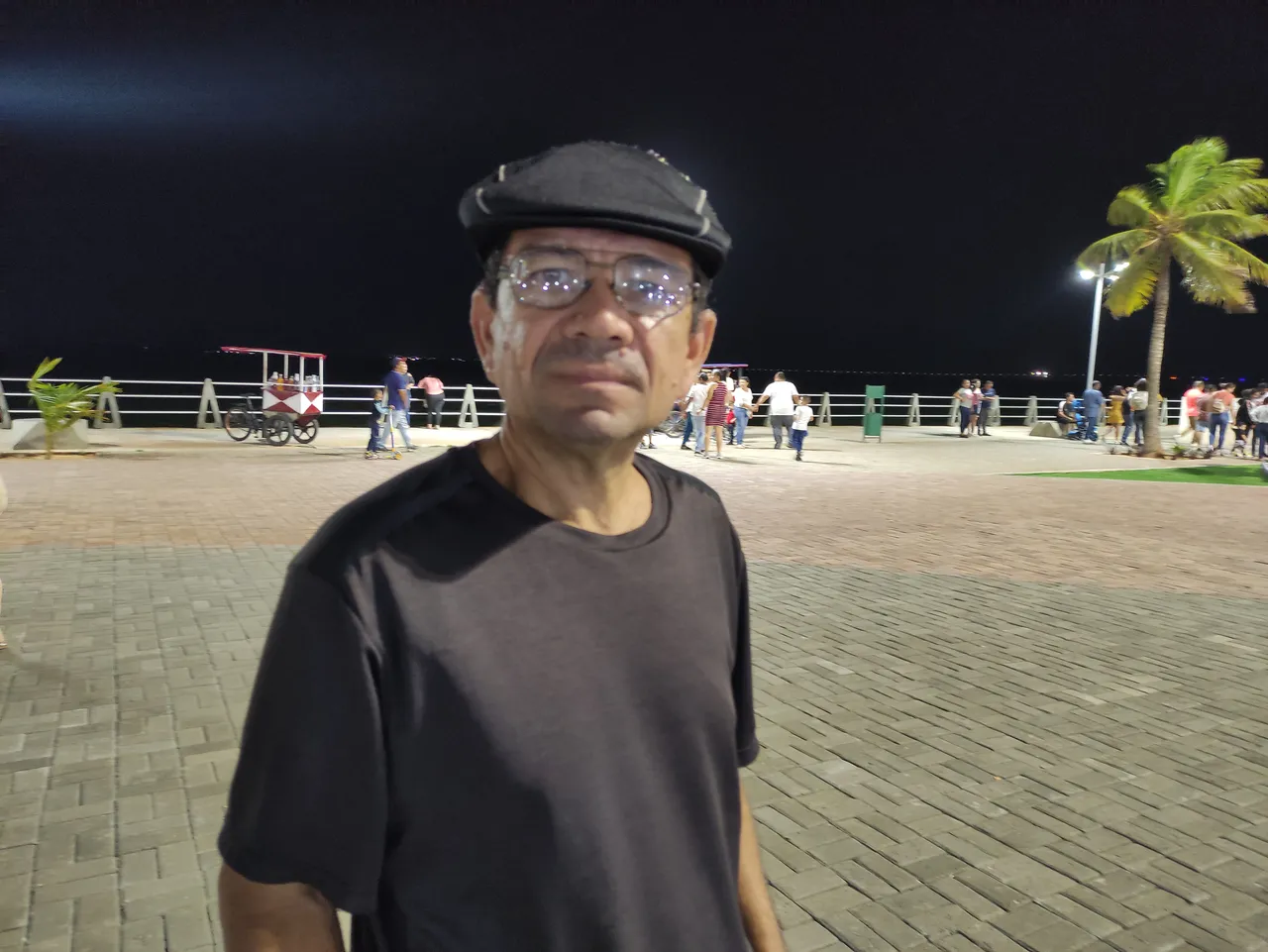
The one in the picture: yes, it's me Tito Peley A.K.A UPHEC

Let's start
An overview
Maracaibo
This is a city of permanent summer. As warm as the city is, so are its people. Despite the weather, the good mood is always present. It is on the shores of an imposing lake and over it crosses a colossus of eight kilometers of concrete that joins its two fronts.
In the waters of my lake, the independence of Venezuela was sealed when Admiral José Prudencio Padilla defeated the fierce Spanish fleet.
And you may ask, what does this have to do with the presentation of this gentleman? My city, my lake, its shores, its bridge and its people have been a source of inspiration for me.
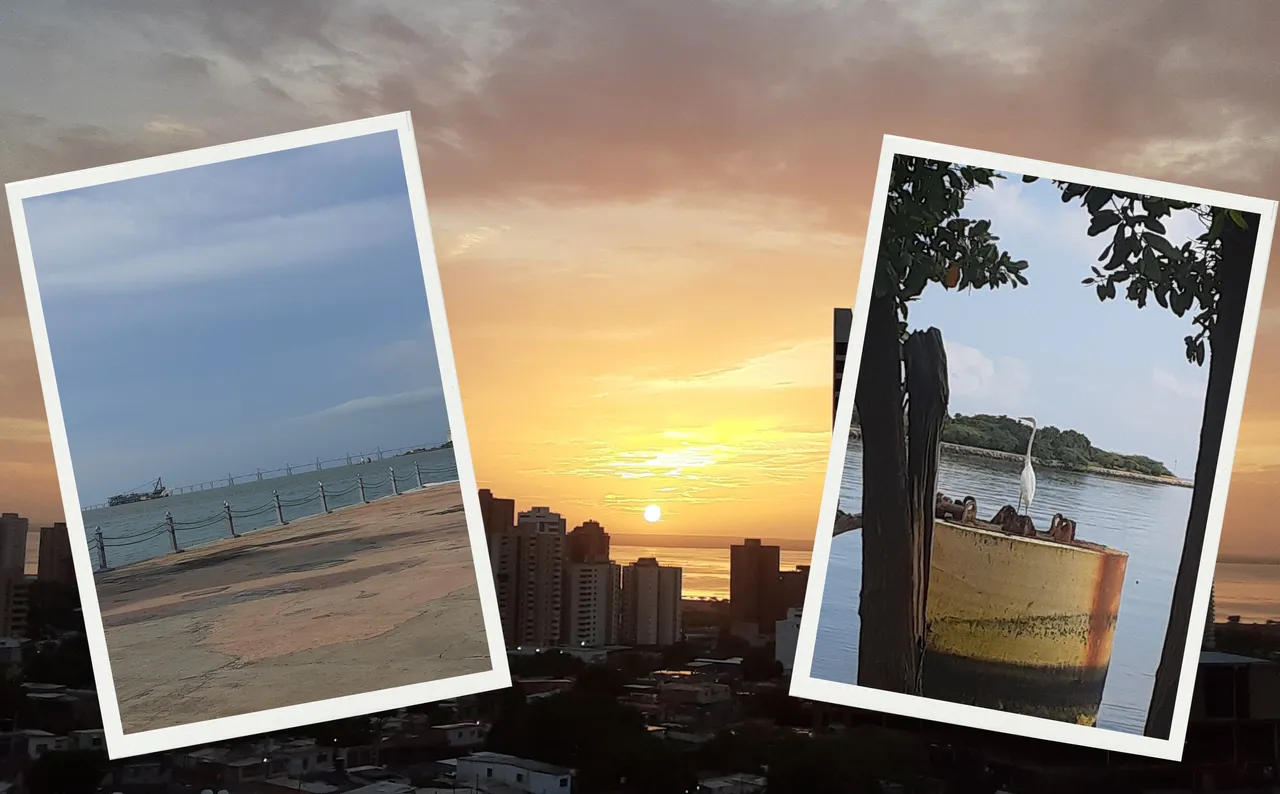
About the image
In the background image you can see a partial view of Maracaibo at sunrise, in the small photos the Maracaibo Lake, the General Rafael Urdaneta bridge and part of the fauna that is on the shores of the lake, the images shown are my property. The collage was made with Canva.
My family
I grew up with mom and dad, I am the eldest of a sister and a brother, the first two are gone, I miss them.My father was an upholsterer and my mother a lover of letters.
What would come out of this mix of genetics?
From youngest to oldest, I give you the answer:
My sister, with a powerful voice, talented for singing.
My brother, with a loose hand, talented for drawing.
And me... Mm, me... well... Me, I was the practice child.
Thirty years I've been a prisoner of the charms of a magnificent woman. With her, as they call her now, I have two blessings. The youngest is 19, still in the present house, and the eldest was 20 when he left us... He went north to conquer a dream that requires firmness in the feet.
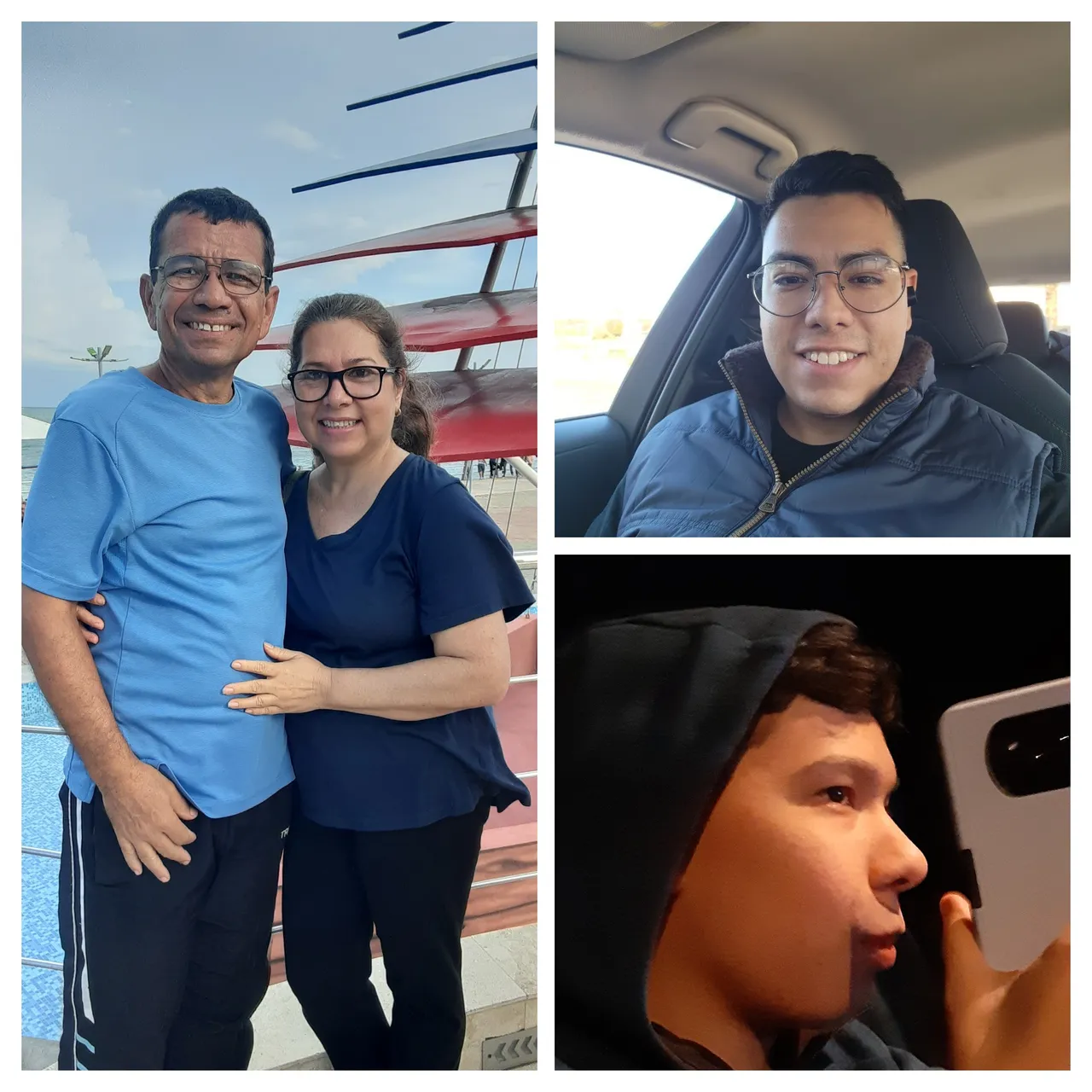
About the image
Picture of my family, not even Satoshi Nakamoto loves his Bitcoins as much as I love these three human beings.
Virtues
Good humor.
Loyal.
Sincere.
Defects
Stubborn.
Capricious
Exaggerated.
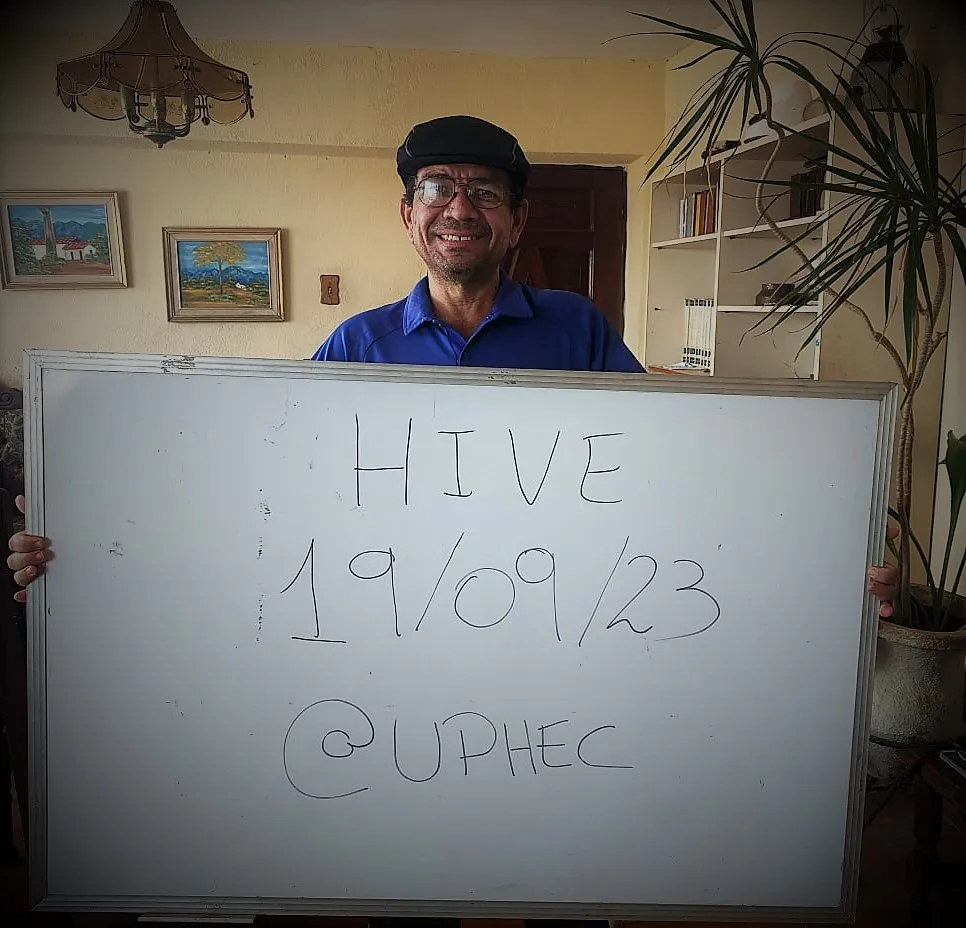
About the image
In the photo, a little of my first virtue and a lot of my third defect. The image shown is my property.
The path of the poet
Beginnings in poetry
It happened when I was very young, around 7 years old. On a family trip to the city of Cumaná, in the eastern part of the country, we visited the birthplace of the Venezuelan poet Andrés Eloy Blanco. I am sure that this visit was the idea of my mother, who just a few years before had left her studies in Letters at the University of Zulia.
Although it was so long ago, I remember details of that visit, such as the poet's room, a kind of open notebook tucked in a glass case and a vine in the courtyard; no doubt this must have added to my future interest in writing.
It was in elementary school that some people arrived giving away books. I still remember the titles: Venezuela Heroica, Mocedades de Bolivar and Poemas y algo más. Although I took all three books, I only read the one with the poems.
In that book there were authors like Jorge Luis Borges, Rubén Darío, Sor Juana Inés de la Cruz, Aquiles Nazoa, Andrés Eloy Blanco and others. Of all of them, I only remember the ballad of Hans and Jenny. I also remember that my mother insisted that I read the book of poems in particular.
From then on, the little book was forgotten, as well as my interest in poetry, until one afternoon when I had a fascinating encounter with a grandfather that I remember fondly.
The Lord of the Tenths, Isaías González
I was already fifteen years old. I had a girlfriend who visited on Saturday afternoons, one of these was special. While I was talking with her on the porch of the house, a man of about 70 years old came out, carrying a notebook in his hands. How are the young people," he asked. My girlfriend already knew what he was coming to, so with a sign he told me to go along with him, what followed was magical.
After the formalities of introduction and greetings, Mr. Isaías said to me: Let's see young man, tell me a number from 1 to 200, I played along and said a number, who knows what it would be. Then he opened the notebook, turned a few pages, took a brief look and recited a tenth by heart.
Then he asked: Would you like another one?, of course, I answered, and the same procedure was followed. So I spent that afternoon with Mr. Isaías. To make a long story short, that afternoon I forgot I had a girlfriend. Those hours were wonderful.
That fascination for rhyme, sentence construction and even verse improvisation remained in me then. The following years, my mind was filling up with lyrics.
Years later, I learned that some renowned singers of the Zulian region made records with tenths of Mr. Isaías.
Let this memory serve as a tribute to the memory of Isaías González. Thank you, Maestro.
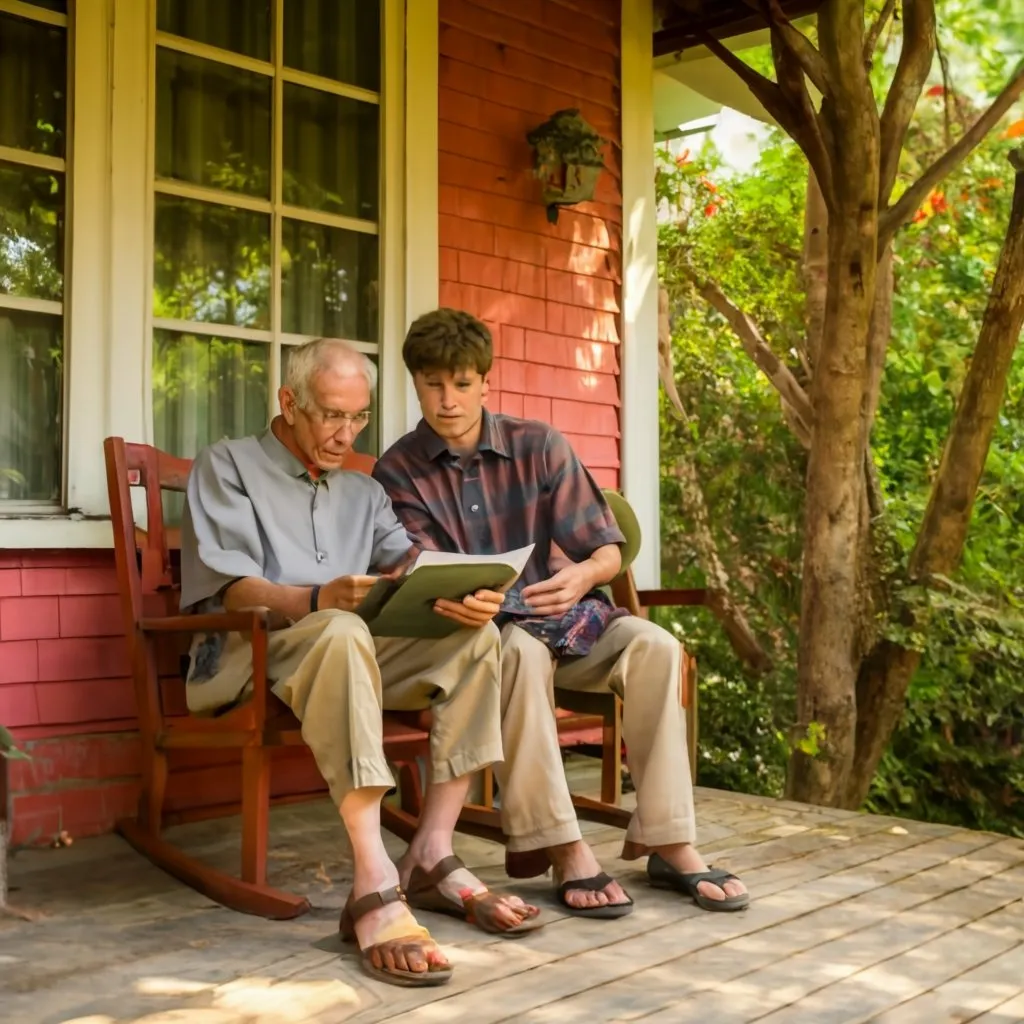
About the image
I don't have an image to remember the moment, using technology, I was able to ask an AI to represent that moment. I did it with ideogram.ai, and I wrote the prompt myself, and it was this:
A 70-year-old man, an expert in composing poems, sits on the front porch of a house under a leafy tree, teaching his 15-year-old grandson the art of composing poems, cinematic, vibrant.
I start writing
It was around 2006 or 2007, I don't remember well. What I do remember is that Facebook was something new and I didn't like it because everything was in English. At that time I thought I was a poet because I made some rhymes.
There were no such platforms as we have today. There were people who shared on forums or made their own websites, and it was on these that I started to write. One was called Arihua and the other was Asterion's house, I've never seen anything like what was there again.
There were weekly competitions and we would fight over medals of symbolic value. Every day there was a picture and a challenge, and then we would write about it.
There were some very good people writing, even professionals. Some criticized hard what they didn't like about your work, sometimes they made me feel that I had to go back to school to learn a, e, i, o, u.
I learned a lot, I could tell because little by little there were more compliments and the harsh criticisms changed their tone to suggestions. All in all, I don't consider myself an expert and I like to share what I do and how I do it.
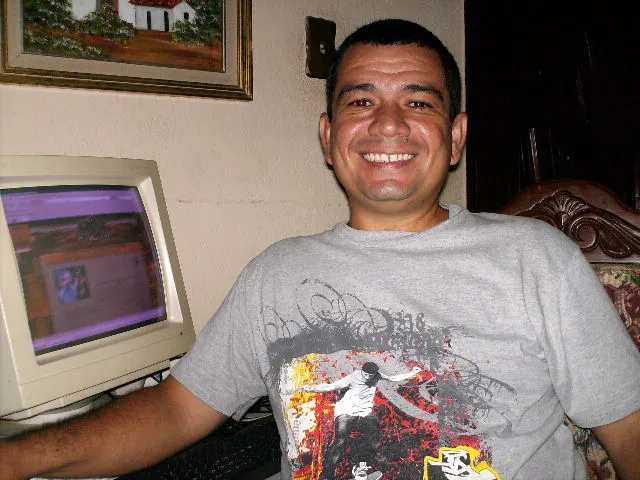
About the image
This image is from the time, what you see on the monitor screen is the home page of the website la casa de Asterión, I hadn't noticed that until today, what a surprise! According to google Photos the date is June 11, 2007.
A homemade poet
Over the years I have used a couple of pseudonyms, tepo and solo-paraules was how I identified myself on the sites mentioned above and in general on the networks. I held on to them for a long time, until in 2020 I published a collection of poems "Poetry of a common man, the world according to a homemade poet".
I liked the last sentence very much because I am a self-taught. I have never been in a course or any academy that gave me formal instruction, I do this for pure pleasure and because I feel that I connect with the essence of many things when I write.
As of 2020 I am a homemade poet "UPHEC" and well, with that name I have connected with people and myself.
My creative process
I like to write, especially poetry in free verse or poetic prose. I admire those who can write by doing math and calculating metrics, believe me I have tried, I even have some tools, but when I do it I feel that my hands are tied.
I am a writer of the everyday, what I live I write, the form it will take I never think about it, it just comes out, sometimes it results in a poem, sometimes in a story and sometimes in a reflection.
I like to share where the inspiration that ended up in a piece of writing came from, it is a way to help others. Many times I find myself with this concern in the networks: where do they get so many ideas to write? With that I intend to give a guide based on my own experience, since I do not consider myself an expert or master of writing and letters.
I share with you what happens in my head before, during and after my creative process:
I consider it something singular, I don't usually use notebooks or write down on napkins, simply the idea comes to my mind and I let the letters flow.
Sometimes it can take minutes, sometimes days. In my head there is then a sort of whirlwind of words all going around, it's like a subroutine in my brain that doesn't interfere with whatever I'm doing.
Then it just happens and suddenly boooommm!!!, everything falls into place and verses, phrases, stanzas are formed, I can see them in my head and from there to the PC, modern poets are somewhat divorced from paper.

About the image
Even in moments of rest my head is attentive looking for moments to turn them into words. Photo of my property.
Broadening horizons
Two years ago I came across two styles of writing that caught my attention, the first is the anti-poem and the other is the narrative of the micro-story.
I am exploring the anti-poetry of the Chilean poet Nicanor Parra, I was captivated by his proposal to question it, he thought that if "there was no change over time it would be lost", I think he was right, many people think that poetry are songs to the birds and see it corny and difficult to understand, the solution is in a phrase of this poet:
"Poetry will die if it is not offended, you have to own it and humiliate it in public. Then we will see what we can do". "
- Nicanor Parra, "Artifacts" -
It is not easy to make a good antipoem, after several attempts I have already been able to make some that I dare to call them so. Although I am still inconsistent in achieving it. It is not easy to kill a poet. This style has already been added to my repertoire.
The other thing that captivated me was the micro-story; in fact, this year I am participating for the second time in the International Micro-story Contest sponsored by the César Egido Serrano Foundation.
This time it took me several months to compose the three short stories that I selected to participate, all of them have between 6 and 8 words.
My inspiration for such brevity is the short story "The Dinosaur" by the writer Augusto Monterroso:
"When he woke up, the dinosaur was still there."
That sentence says so much with so little, that's the kind of ideas I want to convey with the brevity of my short stories.
I hope to achieve it at some point with study, practice and exposure of my work.
Why am I in Hive?
Obviously, one of the reasons is the monetization of content and, beyond that, in this community good content is valued and everyone who writes in the first instance what they want is to be read, that their message has the opportunity to influence someone, to brighten their day, make them reflect and why not, feel the same anger or indignation at so many unfair things that happen around us.
I hope that the content I share with you will be to your liking.
And I think I've had enough of talking about me....
I would like to know your opinion and I would also like to get to know you.